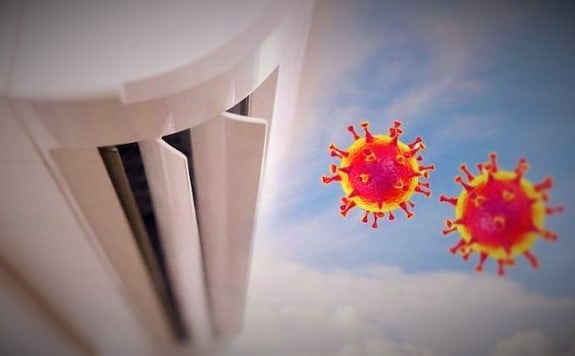India, like the rest of the world, is facing the harmful effects of COVID-19. A lot of concerns have been raised about the probability of the spread of the disease through the operation of Air-conditioning and Ventilation Systems.
Infectious diseases can circulate by different routes including transmission through the air.
The questions being asked are whether their spread can be accelerated by air-conditioning. A group of experts from Indian Society for Heating, Refrigerating & Air Conditioning Engineers (ISHRAE) discussed the COVID19 guidelines and questions about the operation of air-conditioning systems. Below are some questions and answers specifically for residential units:
Q1: Is the coronavirus airborne? Can coronavirus spread through the air?
The size of a coronavirus particle is in the range of 0.08-0.15 microns (a sheet of paper is 100 microns thick). Ever wondered how tiny the particle is, but shattering the humankind!!
The primary source of the infection is through droplets released by coughing or sneezing. The large droplets settle on nearby surfaces like table, and desk. People can get affected by touching those infected surfaces; and then touching their eyes, nose, or mouth. The smaller droplets of size equal less than 0.5 microns remain suspended and carried by air. However, these small particles have a lower infection rate.
Q2: What is the effect of the Humidity on the spread of the coronavirus?
The virus enters the body through the human respiratory system. If the moisture in the air is high, it will reduce the transmission of airborne infections. However, humidity has other issues such as mould and fungus formation. Hence, ideally, indoor humidity should be between 40-70% (you will feel like sweating at more than 70% humidity).
Q3: Is it safe to use AC at home? What is the role of temperature in the coronavirus spread?
Yes, it is safe to use AC at homes provided the following:
- Set room temperature between 24-27°C. For humid locations, the temperature can be closer to 24°C, and in hot-dry locations, it can be close to 27°C.
- The entry of outside air is important. So, keep the window open slightly.
- Use fans with higher fan velocity (Not proven but it can be the possible reason in India for less spread of the virus)
- Always keep AC’s filters clean
Temperatures between 7-8 °C is ideal for virus survival. Between 25-30°C, virus survival has been found to reduce.
Q4: Almost 77% of Indians use desert coolers in summer. Is it safe to use it?
Yes. It can be used but it is advisable to prevent dust entry and maintain hygiene.
- The water tanks must be kept clean and disinfected from time to time.
- The desert coolers must be placed outside of the window to have proper ventilation.
- Portable indoor desert coolers are not recommended as they increase the humidity above 70%.
Q5. What about portable air filters to clean the air?
The portable air filters using HEPA filters are good and purify most of the contaminants of air, but it cannot protect from direct droplets from an infected person or surface.
Q6. Any other important things to remember?
- If using ceiling or pedestal fans, it should be operated with windows kept slightly open
- It is known that flushing toilets create air plumes that contain droplets and droplet residue when toilets are flushed. It is recommended to flush the toilets with closed lids to reduce the release of droplets and droplet residues in the air.

